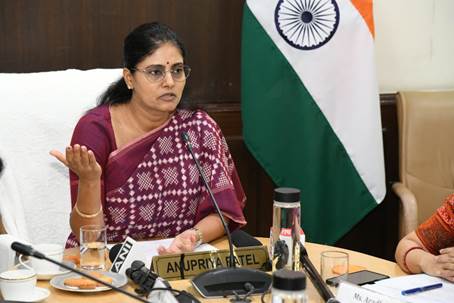New Delhi: In a significant event marking the continuation of World Population Day observances, Union Minister of State for Health and Family Welfare, Anupriya Patel, held a crucial meeting with public health experts to address the theme “Reaching the Last Mile for Ensuring Healthy Timing and Spacing between Pregnancies: Issues & Challenges.” The meeting aimed to emphasize the importance of effective family planning and its role in improving maternal and child health outcomes.
Anupriya Patel highlighted the benefits of adequately spaced pregnancies, stating, “Adequately spaced pregnancies can significantly enhance maternal and child health outcomes. This reduces health risks and empowers women and families to make informed choices about their reproductive health.” She underscored the government’s commitment to these issues through various initiatives, including the Pradhan Mantri Surakshit Matritva Abhiyan (PMSMA), Extended PMSMA, Anemia Mukt Bharat Abhiyan, and the Post-Partum Family Planning Programme.
The Minister noted the reduction in maternal mortality rates from over 130 to 97 per one lakh births as a result of these efforts. She also commended the states for their initiatives to involve men in family planning and stressed the importance of effective communication strategies in achieving the vision of a Viksit Bharat by 2047.
Aradhana Patnaik, Additional Secretary and Mission Director (NHM), MoHFW, reported that India has achieved a Total Fertility Rate (TFR) of 2.0, with 31 States/UTs reaching replacement level. However, she pointed out the need for a strategic approach to bring the TFR under replacement level in the remaining five states.
The event featured discussions with leading public health experts including Dr. Kalpana Apte, Head of the Family Planning Association of India; Dr. Saswati Das, Sexual and Reproductive Health Specialist at UNFPA India; and Dr. Chander Shekhar, Professor and Head of the Department of Fertility and Social Demography at IIPS Mumbai, among others.
Dr. Sudha Prasad highlighted the importance of spacing between children to prevent maternal mortality and emphasized the need for a comprehensive range of contraceptive options. Dr. Kalpana Apte discussed traditional gender norms and the necessity of male involvement in family planning, while Moni Sinha Sagar from USAID India advocated for expanding contraceptive choices and addressing challenges such as teenage pregnancies.
Dr. Somesh Kumar and Dr. Saswati Das shared insights on global best practices in family planning, emphasizing service delivery, social behavior change, and creating enabling environments. They called for targeted outreach to youth and improved access to modern contraceptives.
Dr. Chander Shekhar addressed geographic disparities and unmet needs in family planning, pointing to discontinuation rates and insufficient information about modern methods. Dr. S.K. Sikdar shared experiences from the National Family Planning Programme and outlined future initiatives for improving pregnancy spacing.
Anupriya Patel concluded the meeting by appreciating the experts’ commitment and stressed the need to map regions with low family planning uptake and unmet needs. She advocated for a targeted approach to saturate these areas with enhanced family planning services, improved social and behavior change communication, and active involvement of frontline workers.





